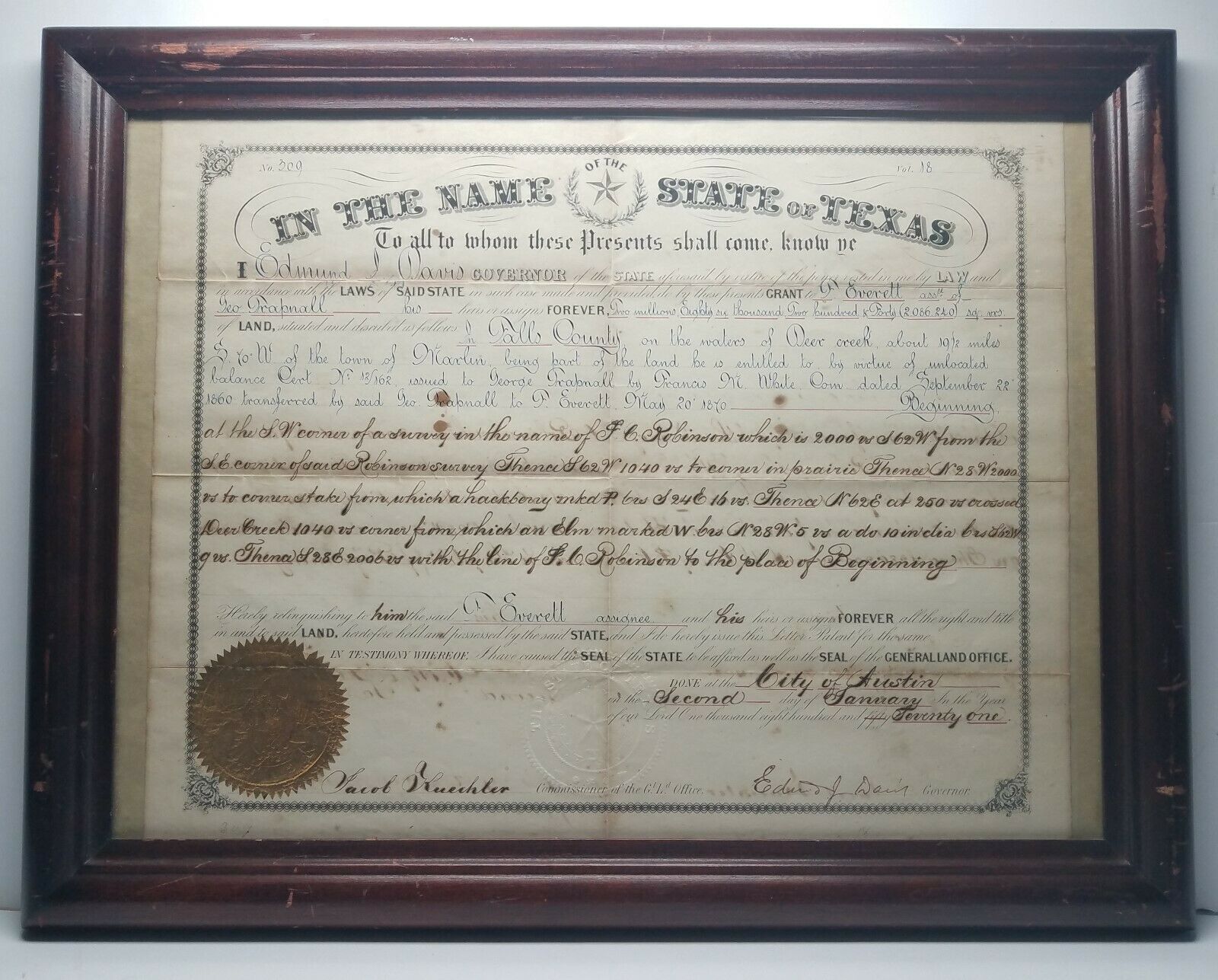-40%
Original 1871 Falls County Texas Land Grant Certificate Gov. Edmund Davis Signed
$ 139.91
- Description
- Size Guide
Description
Original 1871 Falls County ☆ Texas Land Grant Certificate☆ Governor Edmund Davis Signed
In old wood frame
Uncommon with its original Texas General Land Office embossed gold foil starburst seal
Also bears the embossed State of Texas Blind Stamp with central Lone Star
Grant for 2,086,240 square varas (370 acres) along Deer Creek in Falls County, Texas - South West of the town of Marlin
Signed by the 14th Governor of Texas, Edmund J. Davis and Jacob Kuechler,
commissioner of the Texas General Land Office (a pioneer of the science of Dendrochronology)
In very good original antiquarian condition with old folds - staining and ghosting as shown in photos
A fantastic piece of early Texas and Falls County history
Dimensions (Certificate): 14.5"W x 11.5"H
Dimensions (Frame): 18.5"W x 14.5"H
Jacob Kuechler
(1823–1893) was surveyor, conscientious objector during the Civil War, and commissioner of the Texas General Land Office. Kuechler pioneered the science of Dendrochronology to date natural events.
Edmund Jackson Davis
(October 2, 1827 – February 24, 1883) was an American lawyer, soldier, and politician. He was a Southern Unionist and a general in the Union Army in the American Civil War. He also served for one term from 1870 to 1874 as the 14th Governor of Texas.
Following the end of the war, Davis became a member of the 1866 Texas Constitutional Convention. He supported the rights of freed slaves and urged the division of Texas into several Republican-controlled states.
In 1869, he was narrowly elected governor against Andrew Jackson Hamilton, a Unionist Democrat. Documented cases of serious fraud, presented to Congress and the President, were ignored. As a Radical Republican during Reconstruction, his term in office was controversial.
On July 22, 1870, the Texas State Police came into being by Radical bills, which passed the House easily but stalled in the Senate until the thirteen opposition party senators were arrested and detained by Davis police, during this time the entire package of Radical legislation was rushed through. The State Police was to have extraordinary powers, including an unconstitutional privilege of taking offenders from one county to another for trial, and of operating undercover, as secret agents. It worked against racially based crimes, and included black police officers, which caused protest from former slaveowners (and future segregationists). Davis created the "State Guard of Texas" and the "Reserve Militia", which were forerunners of the Texas National Guard.
The Printing Bill provided an official public printer, a state journal, and provided that regional newspapers be designated to print the various required official notices. This in effect instantly created an "official" state press, subject to government control and influence.
Davis' government was marked by controversy, corruption, disenfranchisement of Texans, and Carpetbagger rule. One of his protégés was Norris Wright Cuney of Galveston, who continued the struggle for equality until his own death in 1896 and is honored as one of the important figures in Texas and American black history. He also gained the respect and friendship of Spanish-speaking residents on the Rio Grande frontier. Not only was Davis highly unpopular among the vast majority of Texans, but in order to impose Carpetbagger rule the entire democratic political process was perverted. During the election of 1871, Davis canvasses threw out thousands of votes, including the entire returns of Limestone, Brazos, Bowie, and Marion counties, on specious grounds.
In 1873, Davis was defeated for reelection by Democrat Richard Coke (42,633 votes to 85,549 votes) in an election marked by irregularities. Davis contested the results and refused to leave his office on the ground floor of the Capitol. Democratic lawmakers and Governor-elect Coke reportedly had to climb ladders to the Capitol's second story where the legislature convened. When President Grant refused to send troops to the defeated governor's rescue, Davis reluctantly left the capital in January 1874. He locked the door to the governor's office and took the key, forcing Coke's supporters to break in with an axe.
Davis was the last Republican governor of Texas until Republican Bill Clements defeated the Democrat John Luke Hill in 1978 and assumed the governorship the following January, 105 years after Davis vacated the office.
Edmund J. Davis died in 1883 and was given a war hero's burial at the Texas State Cemetery in Austin. A large gravestone was placed in Davis' honor by a brother.
















